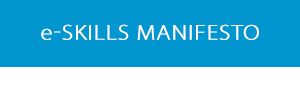ΝΕΑ

07/01/2016
Crossing the digital divide
With digital technologies being the main engine for growth, demand for ICT skilled workers is growing every year. The rapidly developing digital economy means that more and more highly skilled ICT employees will be needed in near future to fill in job vacancies.
In a recent article in The Parliament Magazine (issue 425, 21 December 2015, pages 14 -15) Colin Mackay focuses on the importance of digital skills and the role that stakeholders can play in the promotion of ICT literacy. As demand for digitally skilled workers is growing every year, the relevance of initiatives like eSkills for Jobs 2015 – 2016 is very timely. As Natasja Bohez-Rubiano, a member of European Commissioner Marianne Thyssen’s employment, social affairs, skills and labour mobility team explains “The symbiosis between innovative business and a highly-skilled and productive workforce is a huge factor for European competitiveness.” The yet untapped potential of digital transformation can be unleashed by giving citizens easy access to educational programmes that improve their ICT literacy and leadership skills.
Ilhan Kyuchyuk, Bulgarian MEP from the ALDE group, is another supporter of digital skills training. “Digital skills are now core life skills”, he says and adds that “they need the same importance as numeracy, literacy and language learning in schools. Otherwise, we risk falling behind the rest of the world”.
Investing in the workers employability by acquiring digital skills increases workers choices and chances when seeking job and makes employees more attractive to employers. By adding ICT skills to their qualifications, future employees can benefit from faster entry in the job force and better salaries. eSkills for Jobs 2015 - 2016 campaign has the ambition and potential to give people the right skills so they become competitive in the 21st century job market.
The need for long-term commitment for overcoming the digital divide is highlighted in another article in the same issue of The Parliament Magazine (pages 16 - 17) – special contribution by Andrus Ansip, Vice-President for the Digital Single Market in the European Commission. As more and more people need to upgrade their skillset, online courses on ICT competencies, new pedagogies and flexible learning approaches will support the recognition for digital skills and qualifications and raise the level of ICT competences on European level. As Vice-President Ansip concludes: “We will aim to make the best use of all available EU and national funding instruments to support the development of digital skills. This will require a significant collaborative effort by all interested parties from across government, industry, the education community and society”.
eSkills for Jobs 2015 – 2016, which unites the forces of over 210 private sector companies, NGOs and government bodies, holds the promise of enhancing the creation of large pool of digitally skilled talents in Europe.










